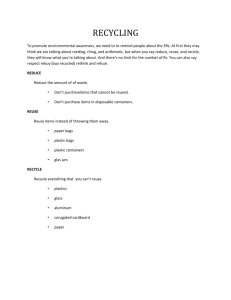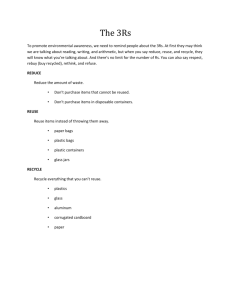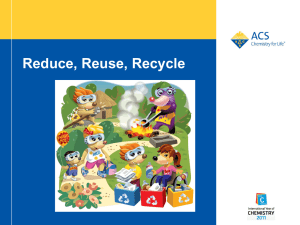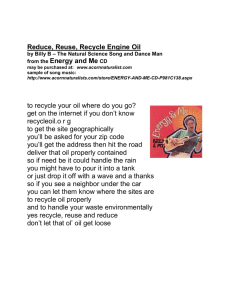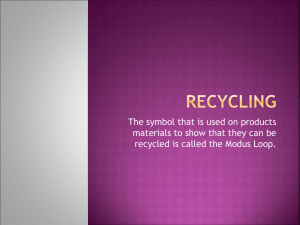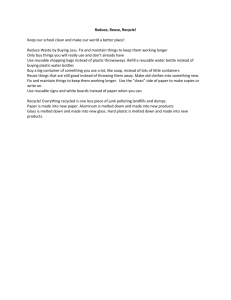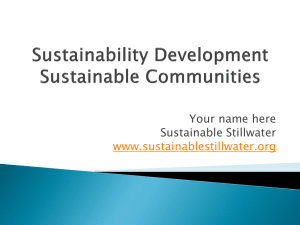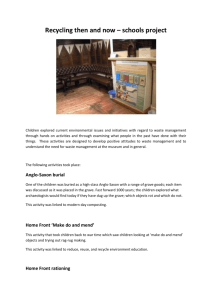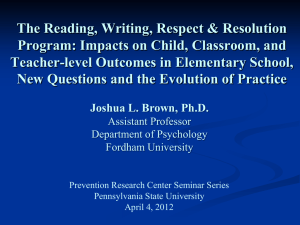`4Rs: Where R U?` activity guide and worksheet
advertisement
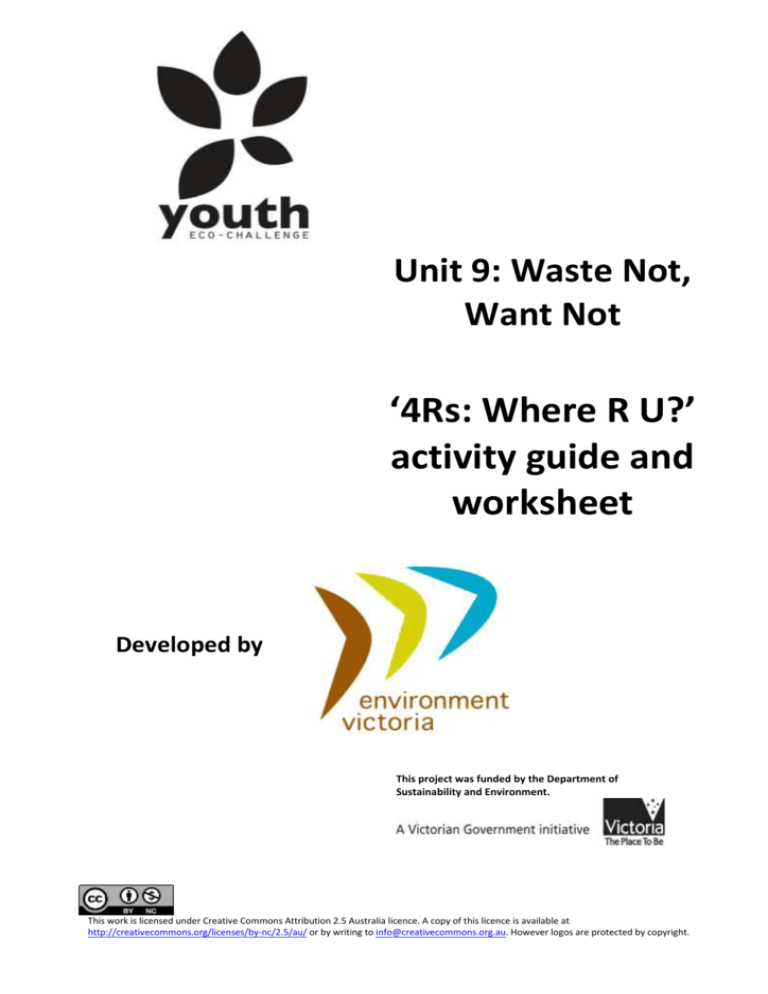
Unit 9: Waste Not, Want Not ‘4Rs: Where R U?’ activity guide and worksheet Developed by This project was funded by the Department of Sustainability and Environment. This work is licensed under Creative Commons Attribution 2.5 Australia licence. A copy of this licence is available at http://creativecommons.org/licenses/by-nc/2.5/au/ or by writing to info@creativecommons.org.au. However logos are protected by copyright. Page 1 of 5 Unit 9: Waste Not, Want Not ‘4Rs: Where R U?’ activity guide Estimated duration: 20 minutes Aim To increase waste reduction behaviours: refuse (avoid), reduce, reuse and recycle. Outcome By the end of this class, students will be able to: understand their own waste management practices develop ideas and strategies to reduce waste Resources Worksheet: ‘4Rs: Where R U?’ Calculator Activity Description 1. Distribute the worksheet to each student. 2. Ask them to fill in the survey on the worksheet, putting a zero next to anything they never do, a one next to things they sometimes do, and a two next to things they always do. 3. Ask them to calculate their sub-totals for each of the 4Rs: refuse, reduce, reuse and recycle. Then have them calculate their percentages for each R. The students may need to revise how to calculate percentages. 4. Answer the questions on the worksheet to help summarise and consolidate learning, and discuss the results with the class. Student Roles and Responsibilities Participate in agreed tasks Contribute to class discussions Complete activities and worksheets Seek teacher assistance and support when needed Level of Teacher Support Facilitate discussion Organise materials and equipment Provide encouragement Introduce tasks and activities Page 2 of 5 Provide assistance when requested Teach or reinforce numerical skills and understanding Assessment To use this learning activity as an assessment task, collect evidence such as: Teacher checklist and observation Copies of student materials and worksheets Teacher checklist for class discussions Page 3 of 5 Unit 9: Waste Not, Want Not ‘4Rs. Where RU?’ worksheet Complete the following survey on the 4 Rs: Refuse Reduce Reuse and Recycle. Score each question with 0= Never, 1 = Sometimes or 2 = Always Refuse At the shops, how often do you: Never Sometimes Always 1. Take your own bag or basket 0 1 2 2. Avoid cheap items which are likely to break, and buy 0 1 2 better quality durable items instead 3. Avoid buying things you don’t need 0 1 2 4. Chose items you can refilled or which are made from 0 1 2 materials which can be recycled 5. Buy products made from recycled materials, e.g paper 0 1 2 6. Choose the largest product with the least packaging 0 1 2 Sub total out of total score of 12 = ______________ Reduce How often do you: Never Sometimes Always 1. Make gifts and cards rather than buying them 0 1 2 2. Make your own food at home rather than buying 0 1 2 takeaway food, or buy takeaway food which has no packaging 3. Reduce your use of disposable packaging for your 0 1 2 school lunch (e.g. use reusable bags or containers for sandwiches, avoid individually packaged items – if you have a drink, buy a big bottle for home and put just some of it in a reusable bottle to take with you) 4. Have your clothes, watch and shoes repaired, instead 0 1 2 of replacing them 5. Borrow things that you don’t use very often, instead of 0 1 2 buying your own Sub total out of total score of 10 = ______________ Reuse How often do you: Never Sometimes Always 1. Reuse old envelopes 0 1 2 2. Buy second hand books for school, work and pleasure 0 1 2 3. Reuse paper printed on one side for printing drafts 0 1 2 4. Reuse paper printed on one side for notes 0 1 2 5. Save plastic food containers for lunches or storage 0 1 2 6. Donate plastic containers and egg cartons to schools 0 1 2 and kindergartens 7. Reuse empty glass jars for jams and sauces 0 1 2 Sub total out of total score of 14 = ______________ Page 4 of 5 Recycle How often do you recycle: Never Sometimes Always 1. Paper and cardboard 0 1 2 2. Glass jars and bottles 0 1 2 3. Aluminium can 0 1 2 4. Plastic bottles 0 1 2 5. Milk and juice cartons 0 1 2 6. Steel “tin” cans 0 1 2 7. Food and vegetable scraps into a compost bin 0 1 2 8. Unwanted clothes to charities or op shops 0 1 2 9. Plastic supermarket bags 0 1 2 10. Batteries 0 1 2 11. Laser print cartridges 0 1 2 12. Corks 0 1 2 13. Mobile phones 0 1 2 14. Old computers 0 1 2 Sub total out of total score of 28 = ______________ Add up your subtotals: Refuse Reduce Reuse Recycle Total /12 /10 /14 /28 /64 % % % % % Q1. Which is your best R? Q2. What are some new Rs you hadn’t thought of before? Q3. Which R needs the most improvement? Q4. Make a list of three (3) short term and three (3) long term improvement strategies. Page 5 of 5
